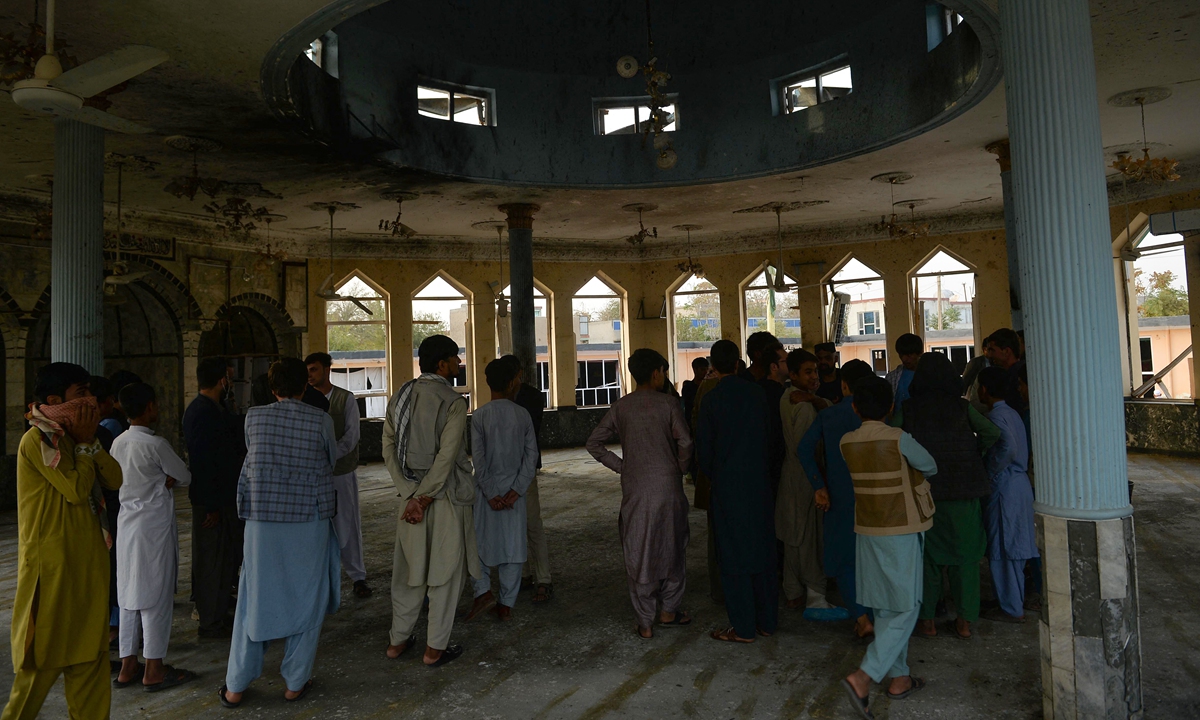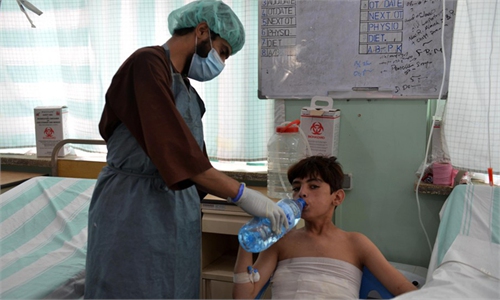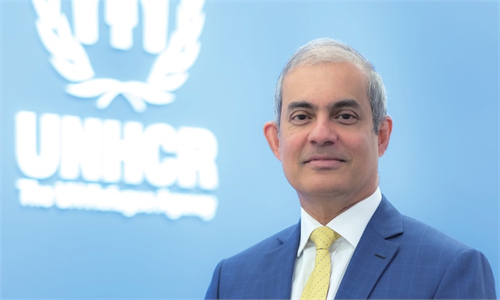
People gahter inside the damaged Sayed Abad Shiite mosque a day after a suicide bomb attack on worshippers in which at least 55 people died, in Kunduz on October 9, 2021. Hoshang Hashimi / AFP
A mosque packed with Shiite Muslim worshippers in northern Afghanistan was struck by a suicide bomber attack on Friday with at least 46 people killed and over 140 wounded. The Associate Press (AP) cited an Islamic State (IS)-linked news agency saying the bomber was identified "as a Uygher Muslim" and "the attack targeted both Shiites and the Taliban for their purported willingness to expel Uyghers to meet demands from China."By emphasizing "Uygur" in the report, the AP probably aimed at playing up the relatively close relations between the Afghan Taliban and China, implying that Taliban is following China's instructions to go after Uygur militants there. In October 2020, the US announced the removal of the East Turkistan Islamic Movement (ETIM) from its list of terrorist organizations. The move actually shows Washington's naked attempt to portray China's anti-terrorism campaign to maintain peace and stability in Northwest China's Xinjiang Uygur Autonomous Region as a persecution and oppression of ordinary Uygur people.
Transferring ETIM members to China for justice could be part of counter-terrorism cooperation between China and the Afghan Taliban government. Actually, the Taliban haven't transferred any of those members to China. Instead, they have left regions bordering China's Xinjiang to other places or being expelled from Afghanistan.
The ETIM is an internationally recognized terrorist group on the United Nations Security Council list. Many of its members joined the IS terror network during the war in Syria, but after the IS was blown up, the militants returned to Afghanistan and other Central Asian countries. This being the case, it is understandable that the US media emphasized the Friday suicide bomber was "Uygher," but downplayed the bomber's true identity as a terrorist.
As a matter of fact, the deliberate Western media's emphasis on the bomber's Uygur identity also shows how the forces outside of China have used the ethnic group as a tool against China. It once again proves the legitimacy of the Chinese government's moves to crack down on terror organizations that use Uygur people for violent and terrorist activities.
When the Taliban came to power, they showed a political determination not to allow Afghanistan to become a hotbed for terrorists anymore. But three attacks on religious institutions in the past week suggest that the Taliban's ability to govern is to be tested. The Taliban government which wants do all it can to stabilize Afghanistan, face a lot of opposition right now. Incessant terrorist attacks, whether against Shiites or other groups, are obstructing the Taliban's efforts.
These destabilizations are likely to continue in the foreseeable future, and the key will be the Taliban's capability to handle the situation. If they are capable, then terrorist attacks in the country will wane, and the Taliban rule will solidify. But this process requires the Taliban government to coordinate and cooperate with all other ethnic groups and political factions, as well as to establish an open and inclusive government as soon as possible.
The Taliban have to maintain the stability of Afghanistan to attract more investments from foreign companies. However, some external forces don't want to see a stable Afghanistan. These forces will secretly support militant organizations, including the terrorist group IS-Khorasan and several resistance groups active in northern Afghanistan. This will be done to deliberately sabotage Afghanistan. For example, India simply could not accept the Taliban as the legitimate government of Afghanistan. New Delhi might try to create chaos in Afghanistan through its secret channels. This might be done in addition to officially denying the legitimacy of the Taliban rule.
Terror attacks are likely to continue in Afghanistan in the future. So far, it is difficult to judge Washington's attitude. The US government worries that terrorists hidden in Afghanistan will put it and the West under threat. But Washington doesn't want to put on too much effort to curb the threat, either. It wants Beijing and Moscow to get deeply involved, so that China and Russia will take on more of the burden - and potentially become targets or being smeared for doing so.
The author is secretary-general of the Research Center for China-South Asia Cooperation at the Shanghai Institutes for International Studies. opinion@globaltimes.com.cn



